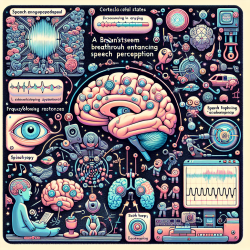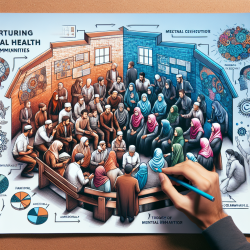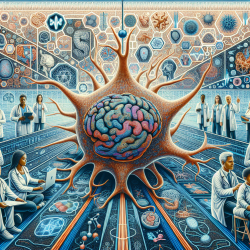In the ever-evolving field of online therapy, practitioners are constantly seeking new ways to enhance their skills and provide the best possible support to their clients. One often overlooked but invaluable resource is cutting-edge scientific research. Today, we delve into the groundbreaking study titled Molecular architecture of the Chikungunya virus replication complex to explore how its findings can inspire and improve therapeutic practices.
Understanding the Research
The research, published in Science Advances, offers a detailed look at the molecular structure of the Chikungunya virus (CHIKV) replication complex. This complex is responsible for synthesizing, processing, and transporting viral RNA within infected cells. The study employed advanced techniques like in vitro reconstitution and in situ electron cryotomography to reveal the intricate architecture of the virus's replication machinery.
Key Findings
The study made several key discoveries:
- The core RNA replicase of CHIKV is composed of the viral polymerase nsP4, which interacts with the nsP2 helicase-protease within a membrane-anchored nsP1 RNA-capping ring.
- A cytoplasmic ring next to the C terminus of nsP1 forms the holo-RNA replication complex, which is observed at the neck of spherules in virus-infected cells.
- The study provided high-resolution structures that offer unprecedented insights into the mechanisms of RNA virus replication.
Implications for Therapy Practitioners
While the direct application of virology research to therapy practices may not be immediately obvious, there are several ways this study can inspire and enhance your skills:
1. Embrace a Multi-Disciplinary Approach
The research exemplifies the power of combining different scientific techniques to achieve groundbreaking results. As a therapist, you can adopt a similar approach by integrating various therapeutic methods and tools to create a more holistic and effective treatment plan for your clients.
2. Foster a Culture of Continuous Learning
The detailed exploration of the CHIKV replication complex underscores the importance of staying updated with the latest scientific advancements. Make it a habit to read current research and attend relevant workshops or webinars. This continuous learning will keep your skills sharp and your knowledge base robust.
3. Encourage Collaborative Efforts
The study was a collaborative effort involving multiple researchers and institutions. In your practice, fostering collaboration with other professionals—whether they are therapists, educators, or medical experts—can lead to more comprehensive and effective client care.
4. Implement Evidence-Based Practices
Just as the study relied on empirical data to draw conclusions, your therapeutic interventions should be grounded in evidence-based practices. This ensures that your methods are scientifically validated and more likely to yield positive outcomes for your clients.
Encouraging Further Research
Finally, let this study serve as a reminder of the importance of research in advancing our understanding and improving our practices. Encourage your colleagues and even your clients to value and support scientific research. Whether it's through participating in studies, staying informed about new findings, or applying research insights to practice, every effort counts.
To read the original research paper, please follow this link: Molecular architecture of the Chikungunya virus replication complex.
By integrating the insights from this groundbreaking research into your practice, you can enhance your therapeutic skills and make a significant impact on the lives of your clients. Stay inspired, stay informed, and continue to strive for excellence in your field.










